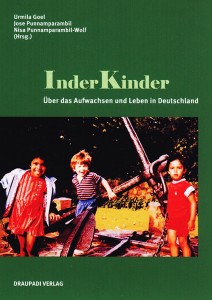Dealing Creatively with Ethnic Classifications
Tomorrow at the Academy of the Jewish Museum Berlin, Urmila Goel and Nisa Punnamparambil-Wolf will introduce the book they edited, InderKinder – Über das Aufwachsen und Leben in Deutschland (Indian-Children: on Growing Up and Living in Germany, published by Drapaudi Verlag). It’s the third in a series of events on “New German Stories” where, with the aid of individual biographies, we examine Germany’s historical and current status as an immigration society. On this occasion we’ll focus on the children of immigrants from India, who gained public awareness for the first time during the “Green Card” campaign of 2000.
Prior to the reading and discussion tomorrow, we asked the two editors, Nisa Punnamparambil-Wolf and Urmila Goel, three questions:
What made you choose this title?
We’re referring with this title to the marginalizing “Kinder statt Inder” (children instead of Indians) campaign of the year 2000. The wordplay of InderKinder (Indian-children) is meant ironically: it was important to us to find a creative way to deal with these attributions. With the book, we want to show the varied ways that people who grew up and live in Germany handle the classification of being a child of Indian immigrants.
The book consists of two parts, autobiographical stories and essays. How would you explain your concept?
→ continue reading
